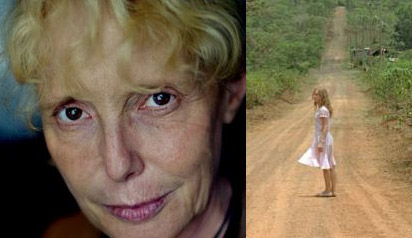ARCHIVE
Q&A: CLAIRE DENIS, Director of White Material: An Online Exclusive
An Online Exclusive

Thursday, October 08, 2009
By José Teodoro
Maria (Isabelle Huppert) is the foreman of a French-owned African coffee plantation in precarious proximity to spreading violence between local military and rebel forces. Claire Denis’ White Material centers on Maria’s refusal to abandon her property, with Huppert’s performance providing a bedrock of tenacity. Though it transpires over only days, the film’s chronology is elliptical, assembled as a sometimes-gauzy collage of scenes, sounds and images. Confused faces are illuminated by fire. Dogs scurry across a dirt road under headlights. A woman hitches a ride on the rear ladder of a bus teeming with passengers. Movement and landscape seems to be the common trigger, and music, whether Stuart Staples’s score or the songs broadcast from a local pro-insurgent radio station, imbues certain transitions with an almost hallucinatory air.
Denis was born in France but raised largely in Africa. Her debut Chocolat (1988) was founded in memories of her childhood experiences there, while Beau Travail (1999) transplanted Herman Melville’s Billy Budd to contemporary Djibouti. Yet White Material represents more of a departure. All of Denis’ films are in some sense politically engaged, yet by any reading White Material would seem exceptionally, even caustically so, drawing directly upon the exploitation of third world resources and the conscription of children. The movie hovers in the borderland between Denis’ eloquent yet typically dreamlike, ambiguity-laden style and a drive toward heightened drama and hard-edged polemic.
Denis spoke with Stop Smiling while attending White Material’s North American premiere at the Toronto International Film Festival.
Stop Smiling: As a portrait of whites in Africa, White Material represents a fairly radical departure from Chocolat. Yet it shares with that film a certain looseness or subjectivity with regards to time. It still has the feeling of a memory play.
Claire Denis: But as opposed to Chocolat, this is not a period film. It’s not the memories of some time that’s long passed. The main character is simply blind to the urgency of her situation. She’s too slow. She thinks she’s not in danger.
SS: She seems to feel entitled to a sense of belonging in a place where she’s clearly not very welcome.
CD: But I don’t think there’s any melancholy in her. She’s a white person working land that costs next to nothing, that provides her with a quality of life that she couldn’t have in France. In Africa she’s a landowner.
SS: She also seems to regard it as her home.
CD: Yeah, it’s home. But I think somewhere deep down she knows it’s not really her home. It’s a sort of home chosen because it gives her a more interesting life.
SS: Do you identify with this feeling, however false it might be, of belonging in some place that’s not your homeland?
CD: No. My own personal relation to Africa is not a melancholic one. Sometimes I’m sad because of what’s happening there. Sometimes I’m furious when I think of the International Monetary Fund and their politics of privatization as a method of stopping corruption, with the result that there is no more free school, no more free train service, et cetera. These are things I feel about Africa. But the type of person Maria is, is a type of person I would not like. She knows there’s nothing waiting for her in France, so she wants to stay. Maria needs to own something. I’m not that type of person. But I understand her. For me, she’s white material. She’s the remnants of colonialism.
SS: So your return to Africa as a filmmaker wasn’t prompted by your personal relationship to the continent, to questions rooted in personal experience?
CD: No, no, no. I was interested in the agricultural industry, and an approach to life there that’s completely different from my childhood in Africa. My father was not a farmer. He was a traveling guy working for the government. Yeah, I remember the smell and the trees. I have somewhere in my mind memories of my childhood. I have a sort of aristocratic idea that I grew up far away from my home and that therefore I have a more open mind. It was a benefit to my life. But I never felt that I belonged there. Maybe I was raised to feel like that. In a way White Material is an answer to that book by Russell Banks, The Darling. I felt the way he described Liberia was maybe too American. I don’t know. Not the way I felt it was, in any case.
SS: The protagonist of that novel is very naïve, as I recall.
CD: I am naïve. Maria is naïve. But I think that Banks’ book is naïve, not the character.


